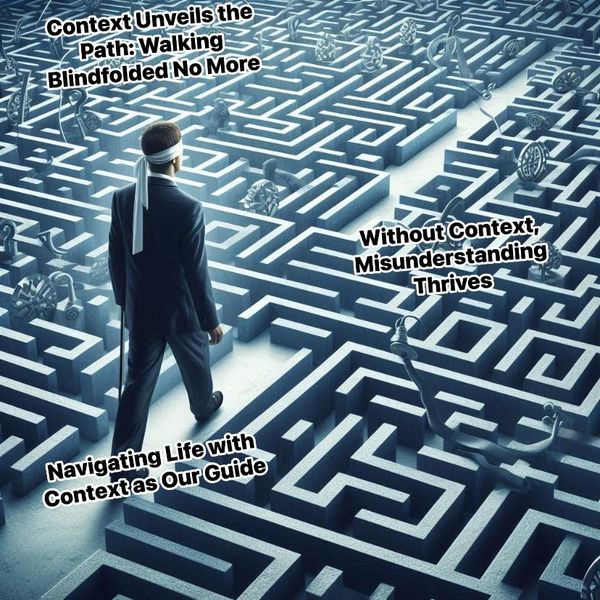
In our lives, if I say something to you and you repeat it to others without me being present, I should have the opportunity to explain the context and background of my statement. This includes detailing the background, tone, purpose, occasion, backdrop, and intended audience. Understanding the context is crucial for grasping the true meaning of what was communicated. Without context, statements can be misunderstood. For example, a statement from holy scriptures can be misinterpreted, leading to misguided beliefs and actions, which can cause social discord or even violence and war. People might deduce polytheism or believe they have the right to rule the world or are the chosen ones, among other serious misunderstandings.
Imagine words as puzzle pieces. If you take a single piece and try to understand the entire picture from it, you’ll likely get it wrong. But when you see all the pieces together, the complete image makes sense. Similarly, knowing the full details of a statement—such as the occasion it was made, the people and audience involved, the reasons behind it, and the speaker’s intention—makes accurate interpretation easier. This issue arises in everyday life, among politicians, in courts, in international settings, and during regular conversations.
Politicians need to understand the context of their constituency to serve their electorate effectively. This means grasping the unique challenges, needs, and aspirations of the people they represent. Without this understanding, policies and decisions may be out of touch with the realities on the ground, leading to ineffective governance and dissatisfaction among constituents. By knowing the local context, politicians can tailor their initiatives to address specific issues, allocate resources more efficiently, and foster trust and engagement with the community. This contextual awareness enables them to advocate for their constituents’ best interests, ensuring that their voices are heard and their needs are met. Ultimately, a deep understanding of the constituency’s context is essential for politicians to make informed decisions that promote the well-being and prosperity of the people who elected them.
When propaganda is spread by deliberately omitting the context, it’s like a magician’s trick, diverting the audience’s attention with one hand while the real action occurs with the other. Misinterpretations thrive, making it necessary to clarify that our words were taken out of context and to provide the essential background.
Similarly, understanding the context of our customers is crucial for selling more and growing our business. Just as words need context to be accurately interpreted, our customers’ needs, preferences, and circumstances must be fully understood to offer them the right solutions. By grasping the background, tone, purpose, and specific situations of our customers, we can tailor our products and services to meet their unique demands. This not only helps in building trust and loyalty but also ensures that our offerings are relevant and valuable to them. Without this context, our efforts might miss the mark, leading to misunderstandings and missed opportunities. In essence, knowing our customers’ context is like seeing the whole puzzle rather than just a single piece, allowing us to create a complete and satisfying experience for them.

Without context, laws can be misapplied, resulting in the punishment of innocent people, and holy texts can be misinterpreted, leading to the creation of religious sects and other serious problems. Similarly, international laws can be misused, causing the massacre of innocent people.
Think of context as the frame of a painting. Without the frame, the painting might seem incomplete or out of place. The frame helps to present the artwork in its full glory, just as context helps to present words in their true meaning. Similarly, context is like the roots of a tree; without understanding the roots, you can’t fully appreciate the strength and beauty of the tree. In the same way, without understanding the context, you can’t fully grasp the meaning of a statement. Essentially, without context, our decisions are like navigating a maze blindfolded, increasing the likelihood of hitting dead ends and facing unnecessary hardships. Understanding the full picture helps us make informed, thoughtful decisions that align with our goals and values, ultimately leading to a more harmonious and successful life.

